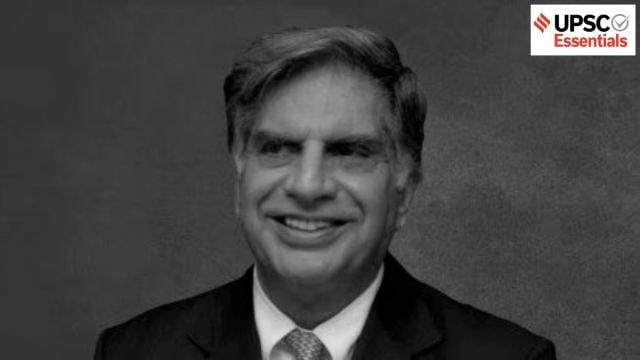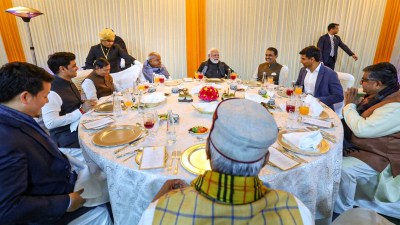Former Tata Group Chairman Ratan Tata, whose dedication to integrity and social upliftment touched the hearts of many, breathed his last on Wednesday. Known for his ethical business practices and commitment to improving lives through social initiatives, Ratan Tata’s life serves as an example of how to bring change.

Kindness
Kindness is a virtue that encompasses the ability to be polite and caring towards others. It entails empathy and compassion towards others.
Ratan Tata had scripted an untold story of humanity and kindness during the darkest period for the Sikh community in 1984, when thousands of them were massacred in the genocide and their vehicles were gutted across Delhi and other parts of north India. Many Sikhs who were truck drivers lost their only source of livelihoods as their vehicles were also targeted by the mobs. That was the time when Ratan Tata emerged as a ray of hope for the Sikh truck drivers, and in a heart-warming gesture, Tata Motors gave away new trucks to genocide survivors, without charging a penny, and helped them restart their businesses from scratch.
Never underestimate the power of kindness, empathy, and compassion in your interactions with others.
(Thought Process for your UPSC Mains Answer writing: Virtues such as kindness, empathy, and compassion play key roles in creating a positive environment, fostering a sense of safety, and building trust with others. Civil servants interact with diverse communities daily. By demonstrating empathy and kindness, they can build trust within the community. Being compassionate in their approach contributes to creating an inclusive and humane society.)
Spirit of Service
It is a quality of a person that encourages one to be committed to public service without any self motives.
During the 26/11 Mumbai Attack, Ratan Tata was the Chairman of the Tata Group at the time and ensured the hotel’s restoration despite the massive destruction of property. He visited employees affected by the attack. Just two weeks after the attack, he formed the Taj Public Service Welfare Trust to not only provide relief to those affected by the terrorist acts but also to set up a system to help and rehabilitate those recovering from such tragic events in the future. It is a display of compassion and resilience in the face of adversity. His compassion for the victims touched the hearts of many. You can read one story about how Ratan Tata helped Ramachandran Nair restart his business after 26/11.
Story continues below this ad
Compassion
Compassion is defined as the emotional response when perceiving suffering and involves an authentic desire to help. Practicing compassion increases our well-being by enhancing a sense of connection to others.
Ratan Tata is famous for his love for animals, particularly dogs. In May, a LinkedIn user shared how she learned that Tata had instructed Mumbai’s Taj Hotel staff to treat stray animals with care if they wander into the premises.
A few months ago on LinkedIn, user Rubi Khan shared a touching story from her visit to the Taj Mahal Hotel. There, she came across a dog resting comfortably in a quiet corner. She soon learned that the dog wasn’t a stray but a long-time resident, lovingly looked after by the hotel staff. This compassionate act, she mentioned, was thanks to Tata’s directives to all the properties.

“We often speak about inclusion, biases, psychological safety, and emotional intelligence. I witnessed all these principles in action here. It’s a fine balance of head and heart, being authentic, and not worrying about what others might think as they enter this esteemed property,” she wrote in her post.
Story continues below this ad
Leadership
A leader is someone who takes the initiative to bring about transformation in society. Leadership is the ability of an individual to guide and influence people. The values, decision-making style, ethics and interpersonal skills of leader profoundly influence the organization’s culture and public perception.
Ratan Tata chose to work as an employee for his own company. He joined Tata in 1961 and worked on the shop floor of Tata Steel. He wanted to get hand-on-experience at the grassroot level to understand the nuances and problem.
I don’t believe in work-life balance. I believe in work-life integration. Make your work and life meaningful and fulfilling, and they will complement each other.
(Thought Process for your UPSC Mains Answer writing: This quote by Ratan Tata conveys that there is a need to adopt harmony in your job and personal life. Personal goals in the job and value systems in life should complement each other to give you satisfaction. A civil servant who is driven by high values works passionately to provide good governance.)
Perseverance
Perseverance is continued persistence in doing what one considers to be right despite difficulties or delays in achieving the desired results. It implies unwavering steadfastness in pursuing the right course of action, even in the face of odds or failures.
Story continues below this ad
Even before the Nano could hit Indian roads, it faced many speed breakers. The car was initially supposed to be manufactured in West Bengal’s Singur, and the former Left Front government had even allocated the land for it. Then came the protests, with Mamata Banerjee, then in the Opposition in the state, creating enough of a stir which ultimately resulted in the plant being shifted to Gujarat’s Sanand. The Tata Nano was launched in 2008
 Ratan Tata at Nano launch at Parsi Gymkhana
Ratan Tata at Nano launch at Parsi Gymkhana
Ups and downs in life are very important to keep us going, because a straight line even in an E.C.G. means we are not alive.
(Thought Process for your UPSC Mains Answer writing: The struggle and failures are part of the journey. They aren’t the defining moment but the shaping moment. Who can better understand this than a UPSC aspirant? Take lessons from those ups and downs. They are essential in life to move forward. It is critical for growth. When you are moving forward and growing, you are winning.)
None can destroy iron, but its own rust can. Likewise, none can destroy a person but his own mindset can.
(Thought Process for your UPSC Mains Answer writing: A positive mindset is the key to success. The internal factors—negative thoughts, procrastination, self-doubt, lack of confidence, or a defeatist attitude- act as a barrier to achieving true potential. It is our mindset which defines our journey. For civil servants, a positive attitude is quintessential for functioning who often function under extreme stress.)
Utilitarianism
Utilitarianism as a principle advocates that from an ethical point of view, an action is right if the sum total of the utilities produced by a particular act emerges greater than the sum total of utilities generated by any other act. “The greatest good for the greatest number.” said, Jeremy Bentham (the father of Utilitarianism).
Story continues below this ad
The Tata Nano was launched in 2008. Ratan Tata said it was “always meant for all our people”. The Nano was often referred to as India’s first ‘lakhtakia’ – a car that costs all of Rs 1 lakh, a few thousand more expensive than two-wheelers. His vision was an embodiment of utilitarianism and inclusivity.
Philanthropy – Social Responsibility
Ratan Tata’s philanthropy work ranges from education, healthcare, and rural development to disaster relief and social welfare. The Tata Trust, under Ratan Tata, has expanded to reflect a deep sense of social responsibility. Sundar Pichai in his condolence tweet highlighted this attribute of Ratan Tata, “… Ratan Tata leaves an extraordinary business and philanthropic legacy and was instrumental in mentoring and developing modern business leadership in India. He deeply cared about making India better. Deep condolences to his loved ones and Rest in Peace Shri Ratan Tata Ji.”
I admire people who are very successful. But if that success has been achieved through too much ruthlessness, then I may admire that person less.
(Thought Process for your UPSC Mains Answer writing: Being successful does not mean compromising your values and ethics. Success at what cost, should be a prime question to be asked. Role modeling and admiration of a person’s achievement should not be based on materialistic gains especially if it is inhumane. No matter how high you climb the ladder of success, you will gain respect only if your feet are on the fertile ground of humanity. See Ratan Tata as an example.)
Subscribe to our UPSC newsletter and stay updated with the news cues from the past week.
Story continues below this ad
Stay updated with the latest UPSC articles by joining our Telegram channel – IndianExpress UPSC Hub, and follow us on Instagram and X.




 Ratan Tata at Nano launch at Parsi Gymkhana
Ratan Tata at Nano launch at Parsi Gymkhana































